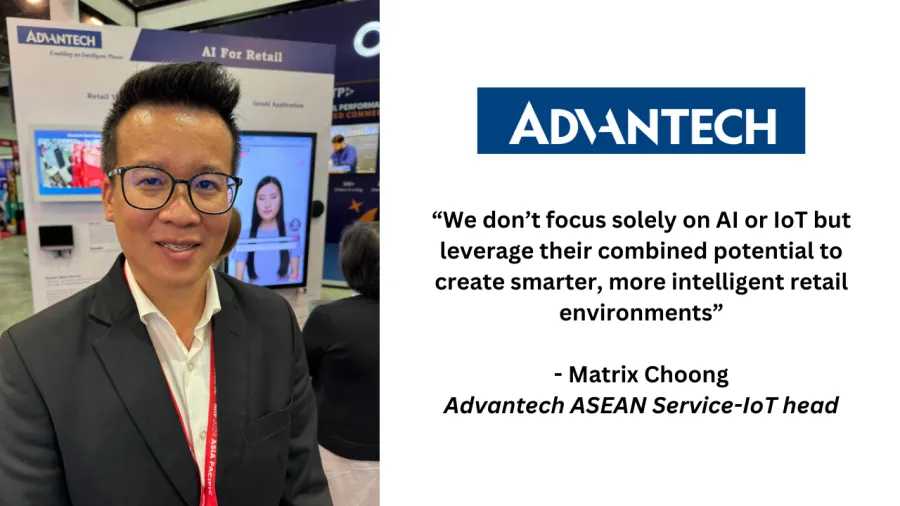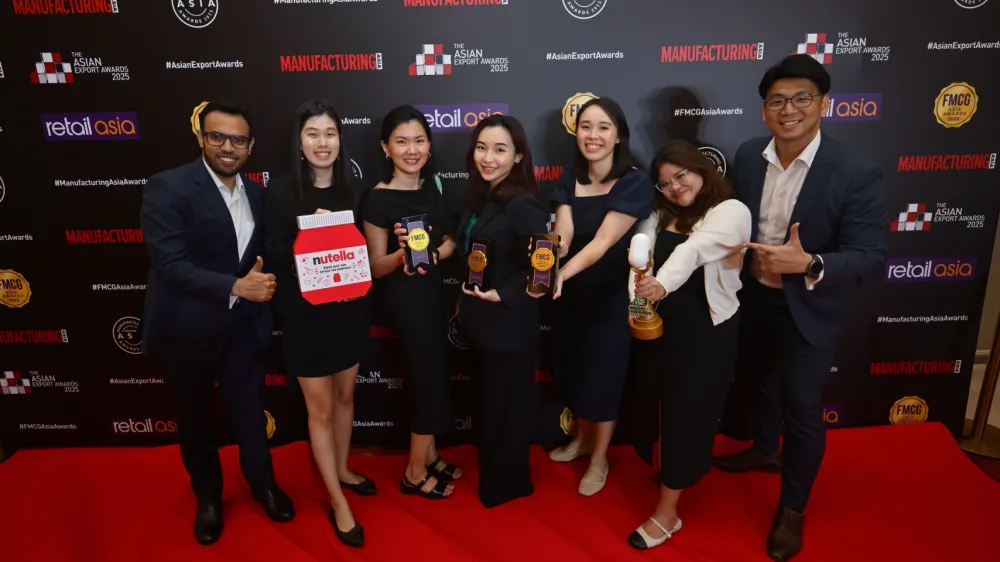
Advantech showcases IoT and AI systems designed for smart retailing across Asia
Retailers must integrate IoT devices with intelligent AI systems to optimise and enhance store operations.
Connecting in-store sensors with AI engines is the new approach retailers in Asia should consider for optimising their operations, according to Matrix Choong, Advantech ASEAN Service-IoT head. Choong shared this perspective during an interview with Retail Asia at Advantech’s stand at the inaugural NRF Retail Show in Singapore in June 2024.
“Advantech excels in integrating AI and IoT, ensuring that both technologies work seamlessly together. We don’t focus solely on AI or IoT but leverage their combined potential to create smarter, more intelligent retail environments,” Mr. Choong said. “We believed this holistic approach positions us as the ideal partner for retailers seeking to enhance their operations,” he added.
Retail stores are increasingly adopting AI, and Advantech’s standout innovation is a generative AI assistant designed specifically for retail environments. This tool manages marketing promotions, answers customer queries, and facilitates payments, offering informative content both in-store and remotely. It’s user-friendly—no technical expertise is needed. Customers simply interact with it as they would with a person, engaging in conversation to get the information they need. Advantech also provides all-in-one terminal computers that handle multiple functions, including kiosk operations and inventory management.
According to Choong, sustainability is driving retailers to focus more on environmental monitoring. Grocery stores, in particular, must maintain optimal conditions to preserve food freshness. To assist with this, Advantech has developed an advanced environmental sensor that tracks temperature, humidity, CO2 levels, air quality, vibrations, door access, and more. The data collected by these sensors is sent via wireless gateways for analysis and cloud storage.
Even camera sensors, traditionally used only for security, now serve multiple functions. With AI analytics, these sensors can analyse video footage and images to assess carbon footprints and energy consumption. This expanded role not only enhances security but also supports sustainability goals and meets the growing consumer demand for environmentally responsible practices.
Additionally, the data captured is crucial for retailers. When supplemented with additional imaging, the system can generate detailed insights and separate datasets for people and objects through AI analytics. It features capabilities such as analysing the foot traffic of individuals entering stores, monitoring stock-keeping units (SKUs), and issuing alerts if quality or environmental controls are compromised.
These features are provided through various applications that can be installed individually on retailers’ local servers. This approach reduces labour and associated costs by streamlining the installation and management process.
Delivering long-term value for retailers
Advantech designed its tools with two key factors in mind: cost and reliability. The company’s sensors are built to perform consistently across multiple locations without needing frequent replacement. “Once we deploy the sensors, they are designed to serve effectively in hundreds or even thousands of stores, minimising the need for redeployment within six or ten months,” Choong explained.
Advantech participated in the National Retail Federation’s NRF 2024 Retail’s Big Show Asia Pacific, where it showcased its AI-enhanced self-service technology. The company highlighted the increasing interest in self-checkout and self-ordering systems, which integrate seamlessly with existing infrastructure to support omnichannel retail operations. Additionally, the AI capabilities enable the tool to generate predictive analyses based on daily scanning and payment data.
Theft prevention
Theft continues to be a significant concern for retailers, particularly with the rise of self-service checkouts and less staff monitoring the store. Choong explained that Advantech addresses "shrinkage" by using AI to match objects with payment data. “If our sensors and AI detect ten items but only nine are paid for, the system will flag the discrepancy and send an alert,” he said
Although theft prevention is not Advantech's primary focus, the company emphasises its collaboration with regional partners who specialise in this area. Advantech remains optimistic about advancements and improvements in theft prevention technologies.
Advantech emphasised that even established stores with existing IoT systems can benefit from ongoing improvements. The company highlighted that its strong partnerships and collaborations with technology innovators are key reasons why retailers prefer its solutions.
Inventory Management
Sensors are also alleviating the burden of inventory counting, according to Choong. “Previously, staff had to record stock manually on paper. Then, handheld scanners were used to scan and compare inventory with the ERP system. Now, RFID and camera technology handle the analytics continuously,” he explained.
A crucial aspect for retailers is the checkout process, where mismatches between the number of queuing customers and the available checkout staff can impact efficiency and customer satisfaction. Choong noted that Advantech's technology can track the number of employees attending to customers, providing valuable insights for store operators. “Our system can also perform loss prevention using AI, offering multiple cross-checks and data validation. This capability adds significant value for retailers,” he added.



















 Advertise
Advertise







